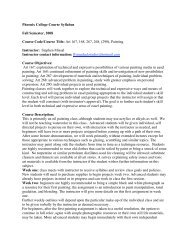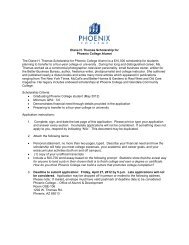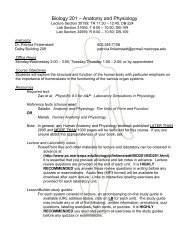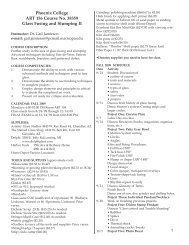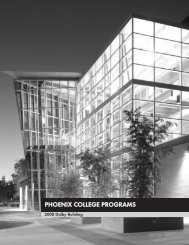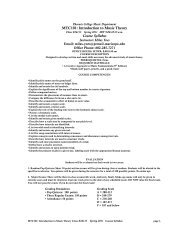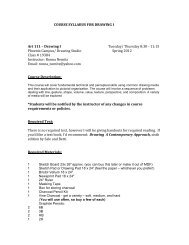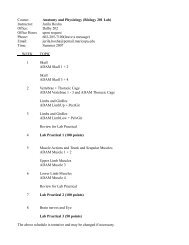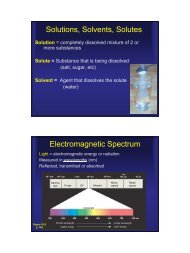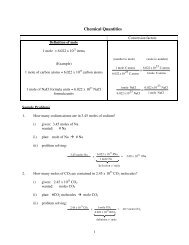Phoenix College Catalog 2009-10
Phoenix College Catalog 2009-10
Phoenix College Catalog 2009-10
Create successful ePaper yourself
Turn your PDF publications into a flip-book with our unique Google optimized e-Paper software.
<strong>Phoenix</strong> <strong>College</strong> <strong>2009</strong>–20<strong>10</strong> CATALOG | 283<br />
HCE176<br />
Practicum: Cellular Biological Staining<br />
3 credit(s) 6 period(s) lab<br />
Practicum in histology techniques performed<br />
in an anatomic laboratory. Recognition of<br />
basic cellular structure, carbohydrate<br />
structures, connective tissue, lipid<br />
structures, and pigments and minerals in<br />
tissues. Application of chemical staining.<br />
Emphasis on stains for nuclear and<br />
cytoplasmic structures, carbohydrates and<br />
lipids, connective tissue, and tissue pigments<br />
and minerals stains. Prerequisites: HCE173<br />
and HCE174. Corequisites: HCE175.<br />
HCE177<br />
Cellular Biological and<br />
Immunohistochemical Staining<br />
3 credit(s) 3 period(s) lecture<br />
Identification of pathologic organisms and<br />
neurological structures. Use of stains for<br />
microorganisms and neurological structures.<br />
Explanation of theories of histochemical and<br />
immunohistochemical staining. Procedures<br />
for histochemical and immunohistochemical<br />
stains. Overview of specimens for electron<br />
microscopy and autopsy procedures.<br />
Emphasis on assessing histology workflow<br />
processes, laboratory procedure manuals,<br />
and workload and productivity recording and<br />
monitors. Prerequisites: HCE175 and<br />
HCE176. Corequisites: HCE178.<br />
HCE178<br />
Practicum: Cellular Biological and<br />
Immunohistochemical Staining<br />
3 credit(s) 6 period(s) lab<br />
Practicum in histology techniques performed<br />
in an anatomic laboratory. Identification of<br />
pathologic organisms and neurological<br />
structures. Use of stains for microorganisms<br />
and neurological structures. Application of<br />
histochemical and immunohistochemical<br />
stains. Observation of electron microscopy<br />
and autopsy procedures. Emphasis on<br />
histology workflow processes, laboratory<br />
procedure manuals, and workload and<br />
productivity recording and monitors.<br />
Prerequisites: HCE175 and HCE176.<br />
Corequisites: HCE177.<br />
HCE190<br />
Clinical Laboratory Operations<br />
2 credit(s) 2 period(s) lecture<br />
Overview of laboratory services, laboratory<br />
professionals, and the role of a medical<br />
laboratory technician (clinical laboratory<br />
technician). Understanding of health care<br />
reform, reimbursement, cost analysis,<br />
coding, credentialing, accreditation, and<br />
regulatory agencies. Emphasis on process<br />
improvement, laboratory mathematics,<br />
statistics, documentation, medico-legal<br />
implications, education, management and<br />
personnel, and specimen integrity.<br />
Application of pre-analytical, analytical, and<br />
post- analytical principles, infection control,<br />
and laboratory safety. Recognition of<br />
acceptable quality control and quality<br />
management principles, phlebotomy<br />
principles, and lab equipment, glassware,<br />
labware, and water purification. Includes<br />
information systems and information<br />
management in laboratories. Importance of<br />
professional growth, communicating with<br />
the patient and public, and ethical conduct.<br />
Prerequisites: Acceptance into the Clinical<br />
Laboratory Sciences program or permission<br />
of Program Director.<br />
HCE221<br />
Administration of Medication<br />
3 credit(s) 4 period(s) lecture + lab<br />
Principles and procedures for administering<br />
medications. Includes classifications, uses,<br />
effects, legal regulations, calculating<br />
dosages, and correct terminology. Emphasis<br />
on oral and parenteral of drug administration.<br />
Prerequisites: HCE167, HCE222, and<br />
acceptance into the Medical Assisting<br />
program, or permission of Program Director.<br />
Corequisites: HCC130 and (HCC145, or<br />
HCC145AA, HCC145AB, and HCC145AC),<br />
or permission of Program Director.<br />
HCE222<br />
Clinical Procedures<br />
3 credit(s) 4 period(s) lecture + lab<br />
Principles and procedures for the medical<br />
assistant. Methods of assisting clinicians<br />
with physical examinations, procedures,<br />
treatments, and minor surgical procedures<br />
in the medical office. Includes vital signs,<br />
height, and weight, collection of patient data<br />
and documentation. Prerequisites: HCE162<br />
and acceptance into the Medical Assisting<br />
program, or permission of Program Director.<br />
Corequisites: HCC130 and (HCC145, or<br />
HCC145AA, HCC145AB, and HCC145AC),<br />
or permission of Program Director.<br />
HCE226<br />
Administrative Procedures<br />
3 credit(s) 3 period(s) lecture<br />
Principles and procedures for front office<br />
administrative skills. Methods of telephone<br />
management, correspondence and mail<br />
processing, appointment scheduling,<br />
medical records management and data<br />
collection. Includes medical assistant as<br />
office manager. Prerequisites: Acceptance<br />
into the Medical Assisting or Medical Front<br />
Office program, or permission of Program<br />
Director. Corequisites: HCC130 and<br />
(HCC145, or HCC145AA, HCC145AB, and<br />
HCC145AC), or permission of Program<br />
Director.<br />
HCE227<br />
Insurance, Billing and Coding<br />
3 credit(s) 3 period(s) lecture + lab<br />
Application of insurance, coding and billing.<br />
Includes legal and ethical issues, federal,<br />
state and private insurance claims, procedural<br />
and diagnostic coding, and banking and<br />
accounting principles. Prerequisites:<br />
Acceptance into the Medical Assisting or<br />
Medical Front Office program, or permission<br />
of Program Director. Corequisites: HCC130<br />
and (HCC145, or HCC145AA, HCC145AB,<br />
and HCC145AC), or permission of Program<br />
Director.<br />
HCE/BPC229<br />
Automated Computer System for<br />
Medical Office Management<br />
2 credit(s) 4 period(s) lecture + lab<br />
Principles and procedures in using an office<br />
automated computerized system for entering<br />
patient information and tracking patient<br />
billing, including basic computer navigation<br />
skills and use of accounting cycle from<br />
originating data to closing ledger entries.<br />
Prerequisites: Acceptance into the Medical<br />
Assisting or Medical Front Office or Medical<br />
Office Support or Medical Office Support:<br />
Basic Clerical program, or permission of<br />
Program Director. Corequisites: HCC130<br />
and (HCC145, or HCC145AA, HCC145AB,<br />
and HCC145AC), or permission of Program<br />
Director.<br />
HCE240<br />
Clinical Urinalysis and Body Fluid<br />
Analysis<br />
3 credit(s) 5 period(s) lecture + lab<br />
Examines anatomy and physiology of the<br />
renal system, renal diseases, and renal<br />
function tests. Emphasis on interpretation,<br />
evaluation, and reporting of urinalysis and<br />
body fluid results, urine and body fluid<br />
collection techniques, types, specimen<br />
handling and preservation, and instrument<br />
calibration, maintenance, and quality control.<br />
Application of body fluid analyses, and<br />
chemical and microscopic analysis of urine.<br />
Prerequisites: Acceptance into the Clinical<br />
Laboratory Sciences program or permission<br />
of Program Director.<br />
Course Descriptions



